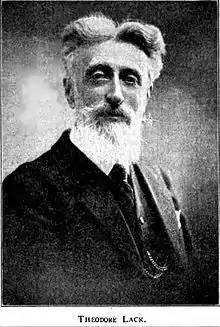Théodore Lack
Théodore Lack (3 September 1846 – 25 November 1921) was a French pianist and composer.

Life
Born in Quimper, he studied under Antoine François Marmontel (pianoforte), Lefébure-Wély (composition) and François Bazin (harmony).[1] He started teaching piano in Paris in 1863 and achieved acclaim as a piano pedagogue.[2]
A very precocious boy, he was appointed organist in his native town at the age of 10 and held this post until he entered the Paris Conservatory in 1860. He graduated in 1864 as winner of many prizes.[3]
The same year he was appointed teacher of pianoforte at the Conservatory. He published a piano method, for which he won Claude Debussy to contribute a piece, The Little Nigar. He never left Paris after his admission to the Conservatory. From 1875 to 1905 he was a member of the committee on admission and of the jury of examinations. In 1881 he became an "Officier de l'Académie".[3] He was known as representing "the finest of salon music".[4]
He died in Paris.
Selected works
Piano music
- Tarentelle, Op. 20
- Boléro, Op. 27
- Études élégantes, Op. 30
- Valse espagnole, Op. 40
- Scènes enfantines, Op. 61
- Études de Mlle. Didi, Op. 85
- Souvenir d'Alsace, Op. 106
- Polonaise de concert
- Sonatina in F Major op. 257, no 2 lV: Finale
Method
- Méthode de Piano, Op. 269, for piano 4-hands
References
- Cooke, James Francis (1910). Standard History of Music, p. 212. Theodore Presser Company.
- Theodore Lack: "How Piano is Studied in France", The Etude vol. 31 no. 2 (Feb 1913).
- Baker's Biographical dictionary of musicians 3rd edition 1919.
 This article incorporates text from this source, which is in the public domain.
This article incorporates text from this source, which is in the public domain. - Presser, Theodore (August 1927). "August Presentation of Piano Composers and their Works". The Etude. Theodore Presser Company: 560.
External links